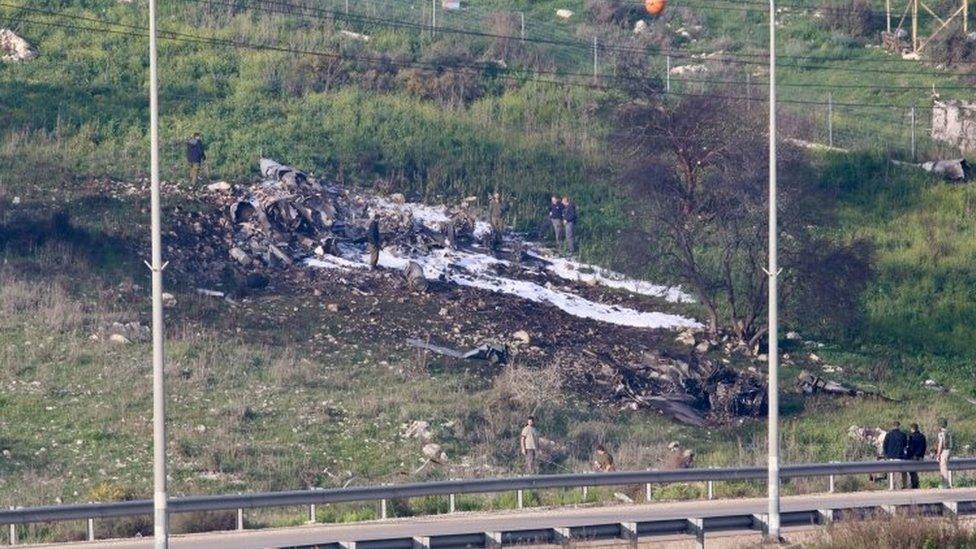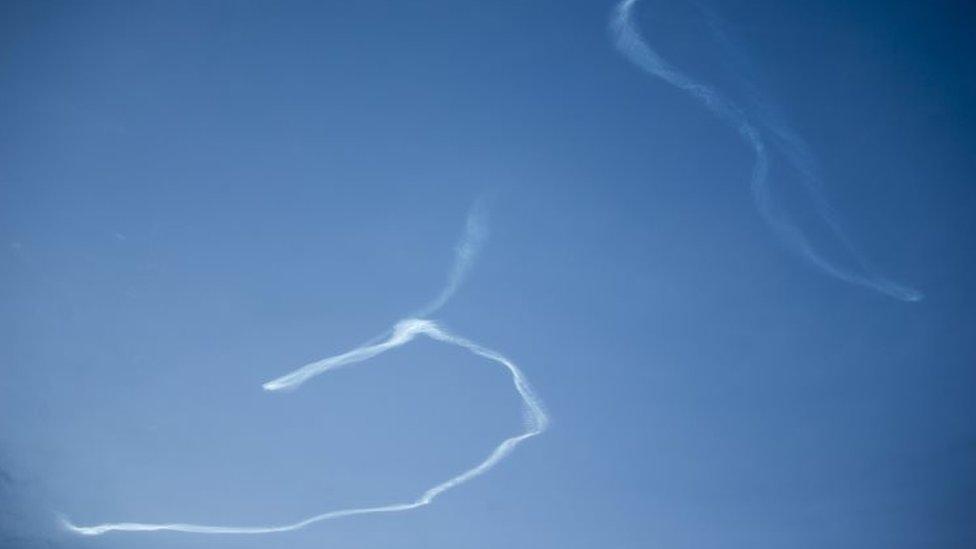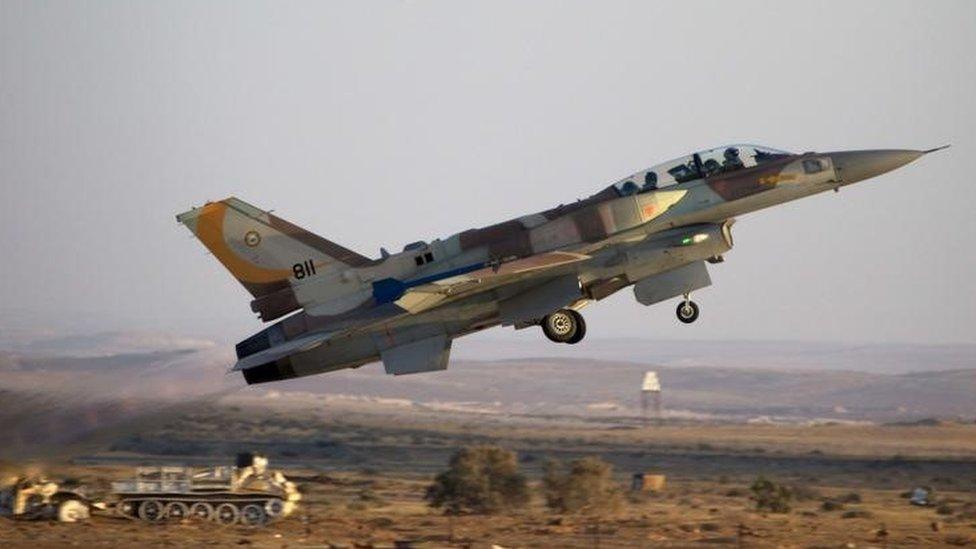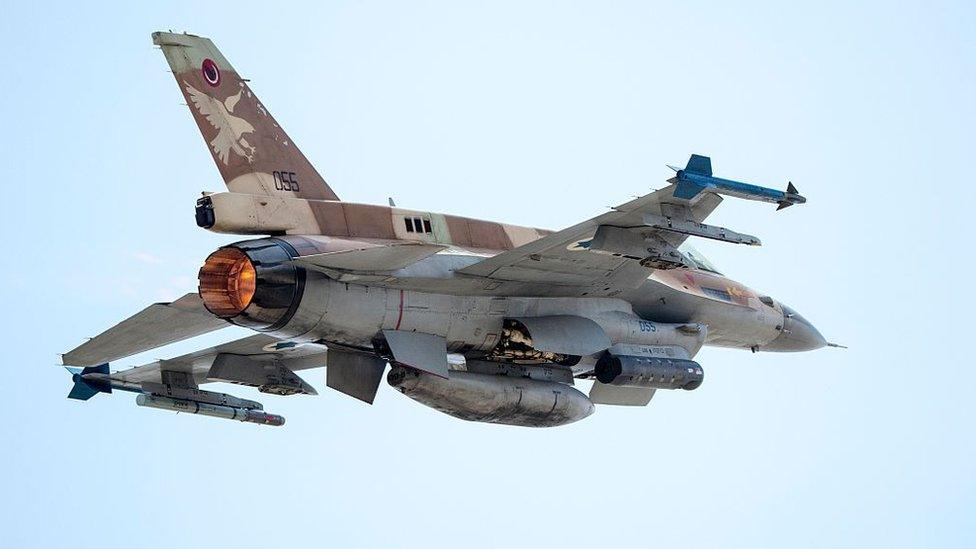Syria shoots down Israeli warplane as conflict escalates
- Published

The Israeli F-16 jet crashed near a village in northern Israel
An Israeli F-16 fighter jet has crashed after being hit by Syrian air defences during an offensive in Syria, the Israeli military says.
The two pilots parachuted to safety before the crash in northern Israel. It is believed to be the first time Israel has lost a jet in the Syrian conflict.
The plane was hit during air strikes in response to an Iranian drone launch into Israeli territory, Israel says.
The drone was shot down. Israel later launched further strikes in Syria.
The Israel Defense Forces (IDF) say they hit aerial defence batteries and Iranian military sites in the latest strikes.
Israeli air strikes in Syria are not unusual, the BBC's Middle East correspondent Tom Bateman says, but the loss of an Israeli fighter jet marks a serious escalation.
In other developments in the Syrian conflict on Saturday:
A Turkish helicopter was shot down as the country continued its offensive against Kurdish fighters in northern Syria. Two soldiers on board were killed, the Turkish military says
UN Human Rights Commissioner Zeid Ra'ad al-Hussein said the past week was one of the bloodiest in Syria since the conflict began in 2011 - with at least 277 civilian deaths reported
How did events unfold on Saturday morning?
The Israeli military says a "combat helicopter successfully intercepted an Iranian UAV [unmanned aerial vehicle] that was launched from Syria and infiltrated Israel".
It tweeted footage which it says shows the drone flying into Israeli territory before being hit.
Allow X content?
This article contains content provided by X. We ask for your permission before anything is loaded, as they may be using cookies and other technologies. You may want to read X’s cookie policy, external and privacy policy, external before accepting. To view this content choose ‘accept and continue’.
In a further response, the IDF "targeted Iranian targets in Syria", according to the military. The mission deep inside Syrian territory was successfully completed, it said.
After coming under Syrian anti-aircraft fire, the F-16's two crew members ejected and were later taken to hospital. One of them was "severely injured as a result of an emergency evacuation", the IDF said.
It is the first time Israel has lost an aircraft in combat since 2006 , externalwhen an Israeli helicopter was shot down over Lebanon by a Hezbollah rocket, the Jerusalem Post reports.
All five crew on board - including a female flight mechanic - were killed in that incident.

Anti-aircraft fire smoke over the Syrian-Israeli border in the Golan Heights
Alert sirens sounded in areas of northern Israel and the Israeli-occupied Golan Heights because of Syrian anti-aircraft fire.
Residents reported hearing a number of explosions and heavy aerial activity in the area near Israel's borders with Jordan and Syria.

The fighter jet was carrying out strikes on Iranian targets in Syria, the Israelis say (file picture)
Syrian state media quoted a military source as saying that the country's air defences had opened fire in response to Israeli "aggression" against a military base on Saturday, hitting "more than one plane".
What did Israel do next?
Israel launched its second wave of strikes in Syria. Eight of the Syrian targets belonged to the fourth Syrian division near Damascus, IDF spokesman Jonathan Conricus said.
All the Israeli aircraft from this sortie returned safely.
"Syrians are playing with fire when they allow Iranians to attack Israel," the spokesman warned.
He added that Israel was willing to exact a heavy price in response but was "are not looking to escalate the situation".
Meanwhile Iran and the Tehran-backed Hezbollah movement in Lebanon - which are allied with the Syrian government - dismissed reports that an Iranian drone had entered Israeli airspace as a "lie".
Russia expressed "serious concern" over the Israeli air strikes and called for all sides to show restraint.
What is the Iranian presence in Syria?
Iran is Israel's arch-enemy, and Iranian troops have been fighting rebel groups since 2011.
Tehran has sent military advisers, volunteer militias and, reportedly, hundreds of fighters from its Quds Force, the overseas arm of the Iranian Revolutionary Guards Corps (IRGC).
It is also believed to have supplied thousands of tonnes of weaponry and munitions to help President Bashar al-Assad's forces and the pro-Iranian Hezbollah, which is fighting on Syria's side.
Tehran has faced accusations that it is seeking to establish not just an arc of influence but a logistical land supply line from Iran through to Hezbollah in Lebanon.

A powerful new element
Analysis by BBC's diplomatic correspondent Jonathan Marcus
For years Israel has been striking at weapons stores and other facilities in Syria with a single goal - to disrupt and, as far as possible, to prevent advanced Iranian missiles being delivered to Hezbollah in Lebanon.
Syria has often been the conduit for these shipments, but the changing balance of power there, with the Assad regime's survival bolstered by Iranian help, has introduced a powerful new element - a direct Iranian role in the crisis.
A more confident Iran is alleged by Israel to be setting up bases in Syria (whether for its own or its proxy Shia Muslim militia forces is unclear).
But it is also alleged to be developing missile factories, both there and in Lebanon, to make the supply lines to Hezbollah less vulnerable.
Israel's campaign to disrupt missile supplies is becoming ever more complex.
And Iran risks becoming a direct actor in this conflict, ever closer to Israel's own borders.


- Published7 February 2018

- Published2 May 2023
